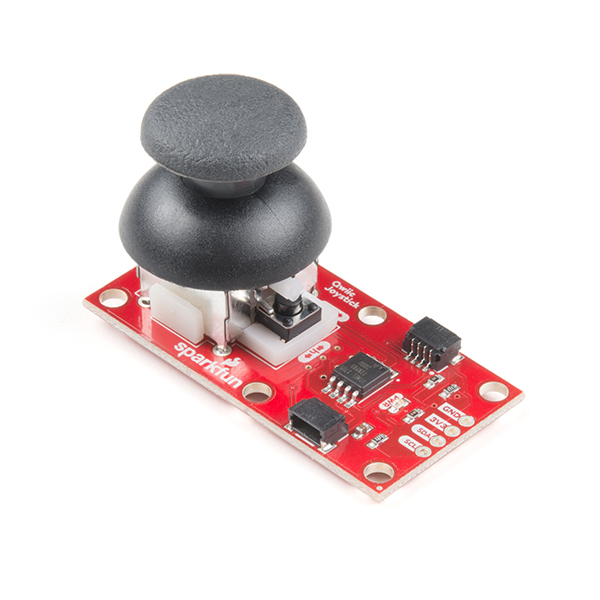

CircuitPython library for Sparkfun Qwiic Joystick. This library is ported from the SparkFun Qwiic Joystick Arduino Library

SparkFun Qwiic Joystick (COM-15168)
This driver depends on:
Please ensure all dependencies are available on the CircuitPython filesystem. This is easily achieved by downloading the Adafruit library and driver bundle or individual libraries can be installed using circup.
Adafruit has an excellent tutorial on Installing CircuitPython Libraries on Raspberry Pi.
- Start with the latest version of Raspbian with Wifi configured.
- Enable SSH, I2C and SPI.
sudo raspi-config- Update your system to the latest version.
sudo apt-get update
sudo apt-get upgrade- Update the python tools
sudo pip3 install --upgrade setuptools(If pip3 is not installed, install it and rerun the command)
sudo apt-get install python3-pip- Install the CircuitPython libraries
pip3 install RPI.GPIO
pip3 install adafruit-blinkaOn supported GNU/Linux systems like the Raspberry Pi, you can install the driver locally from PyPI. To install for current user:
pip3 install sparkfun-circuitpython-qwiicjoystickTo install system-wide (this may be required in some cases):
sudo pip3 install sparkfun-circuitpython-qwiicjoystickTo install in a virtual environment in your current project:
mkdir project-name && cd project-name
python3 -m venv .env
source .env/bin/activate
pip3 install sparkfun-circuitpython-qwiicjoystickMake sure that you have circup installed in your Python environment.
Install it with the following command if necessary:
pip3 install circupWith circup installed and your CircuitPython device connected use the
following command to install:
circup install qwiicjoystickOr the following command to update an existing version:
circup update- Qwiic Joystick Hookup Guide - The Arduino examples in the Hookup Guide are available for Python with this library
- CircuitPython on a Raspberry Pi - Basic information on how to install CircuitPython on a Raspberry Pi.
- Code Example:
# import the CircuitPython board and busio libraries
import board
# Create bus object using the board's I2C port
i2c = board.I2C()
joystick = QwiicJoystick(i2c) # default address is 0x20
# use QwiicJoystick(i2c, address) for a different address
# joystick = QwiicJoystick(i2c, 0x21)"""On supported GNU/Linux systems like the Raspberry Pi, you can upgrade the driver to the latest published version.
To upgrade for current user:
pip3 install --upgrade sparkfun-circuitpython-qwiicjoystickTo upgrade system-wide (this may be required in some cases):
sudo pip3 install --upgrade sparkfun-circuitpython-qwiicjoystickContributions are welcome! Please read our Code of Conduct before contributing to help this project stay welcoming.
For information on building library documentation, please check out this guide.
To build this library locally you'll need to install the circuitpython-build-tools package.
python3 -m venv .env
source .env/bin/activate
pip install circuitpython-build-toolsOnce installed, make sure you are in the virtual environment:
source .env/bin/activateThen run the build:
circuitpython-build-bundles --filename_prefix sparkfun-circuitpython-qwiicjoystick --library_location .This product is open source!
Please review the LICENSE.md file for license information.
Please use, reuse, and modify these files as you see fit.
Please maintain the attributions to SparkFun Electronics and Adafruit and release any derivative under the same license.
Distributed as-is; no warranty is given.